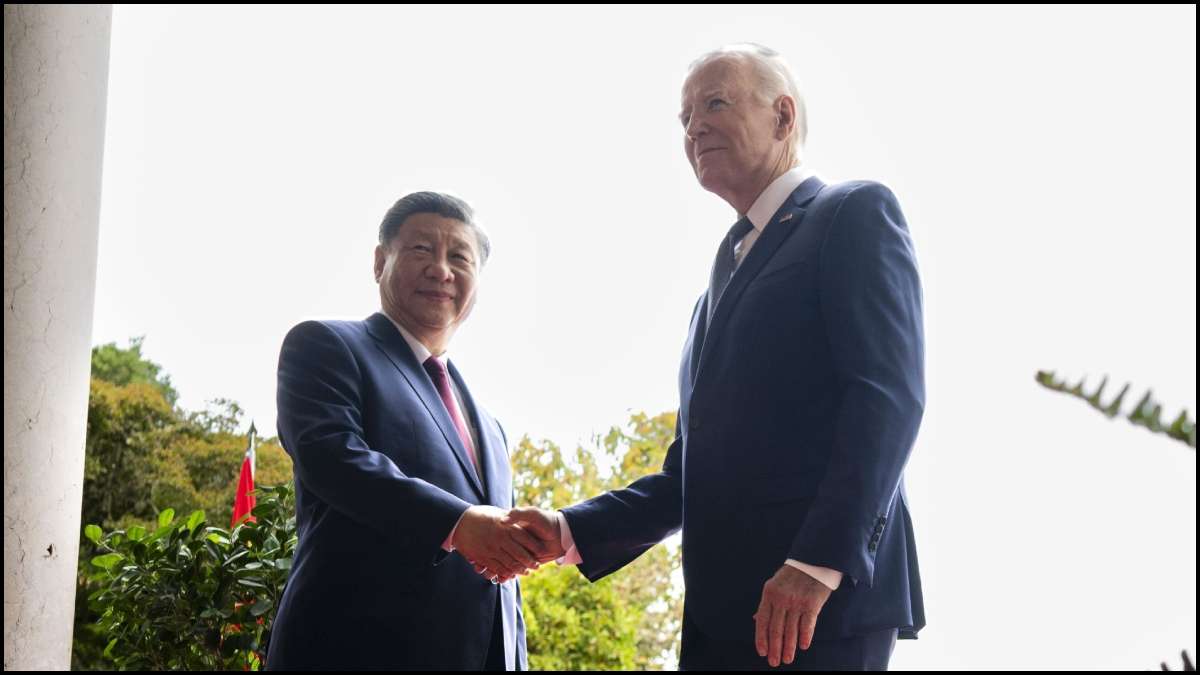
Beijing: Chinese President Xi Jinping, while speaking to his US counterpart Joe Biden on Tuesday, stressed that the Taiwan issue is the “first red line” that must not be crossed by Washington and warned that Beijing will “not sit on its hands” if “Taiwan independence” forces step up their “separatist activities” with the help of external elements. Biden and Xi communicated for the first time since their in-person summit in California last November.
China’s Foreign Ministry also said the two leaders had a “candid and in-depth exchange.” In the call, Xi characterised the US-China relations as “beginning to stabilise,” but he warned that “negative factors” had been growing and required “attention from both sides,” according to a ministry readout. Taiwan was one of the key topics of Biden and Xi’s conversation.
The White House described the one-hour-45-minute conversation as “candid and constructive” on a range of issues on which the leaders agreed and disagreed. Biden stressed the need to maintain “peace and stability” across the Taiwan Strait and he also raised his concerns over China’s support for Russia’s defence industry, the White House said.
What did Xi tell Biden?
Taiwan is one of the key friction points between the US and China. Xi called the issue the “first red line” in the relationship and urged the US to act in accordance “with President Biden’s commitment of not supporting ‘Taiwan independence, according to the ministry readout. China’s ruling Communist Party claims the self-ruling democracy as its territory and has vowed to “reunify” with it, by force if necessary.
“In the face of “Taiwan independence” separatist activities and external encouragement and support for them, China is not going to sit on its hands, Chinese Foreign Ministry Spokesperson Wang Wenbin quoted President Xi as telling Biden. Xi urged the US side to translate President Biden’s commitment of not supporting “Taiwan independence” into concrete actions.
The two presidents also discussed trade and technology issues during their telephone talks. The US side has adopted a string of measures to suppress China’s trade and technology development and is adding more and more Chinese entities to its sanctions lists, to the chagrin of Xi’s administration.
“If the US side is willing to seek mutually beneficial cooperation and share in China’s development dividends, it will always find China’s door open; but if it is adamant on containing China’s hi-tech development and depriving China of its legitimate right to development, China is not going to sit back and watch,” Wang quoted Xi as saying.
US-China ties should remain stable: Xi
The Chinese President stressed that the issue of strategic perception is always fundamental to the China-US relationship and stressed that the countries should not turn their back on each other and avoid conflict or confrontation at all costs. “The relationship should continue moving forward in a stable, sound and sustainable way, rather than going backwards,” he said.
Furthermore, Wang noted that the United States is not a party to the South China Sea issue, which Biden raised during the meeting, and should not intervene in matters between China and the Philippines, Xinhua news agency reported. “China has strong will and resolve to safeguard its territorial sovereignty and maritime rights and interests,” he said.
Biden’s demands to Xi
The 81-year-old US president raised concerns about China’s operations in the South China Sea, including efforts last month to impede the Philippines, which the US is treaty-obligated to defend, from resupplying its forces on the disputed Second Thomas Shoal. He also pressed China to do more to meet its commitments to halt the flow of illegal narcotics and to schedule additional precursor chemicals to prevent their export. He also raised concerns about human rights in China, including Hong Kong’s new restrictive national security law and its treatment of minority groups.
Biden also pressed China over its defence relationship with Russia, which is seeking to rebuild its weaponry and industrial base in its war against Ukraine, and also called on Beijing to wield its influence on North Korea to rein in the nuclear-powered country seemingly preparing for war. Biden also raised concerns with Xi over China’s “unfair economic practices” and said the US would take steps to preserve its security.
The call is meant to demonstrate a return to regular leader-to-leader dialogue between the two powers and kicks off several weeks of high-level engagements between the two countries, with Treasury Secretary Janet Yellen set to travel to China on Thursday and Secretary of State Antony Blinken to follow suit.
US National Security Advisor Jake Sullivan met with the Chinese director of the Office of Foreign Affairs Commission and Foreign Minister Wang Yi in Bangkok on January 27 and Secretary of State Antony Blinken’s meeting with Wang in Munich in February this year. The call highlights the importance of intense diplomacy to manage tensions and prevent unintended conflict, according to senior officials.
(with inputs from AP)
ALSO READ | Biden speaks to Xi Jinping over phone call, discusses US-China bilateral ties, Taiwan and AI